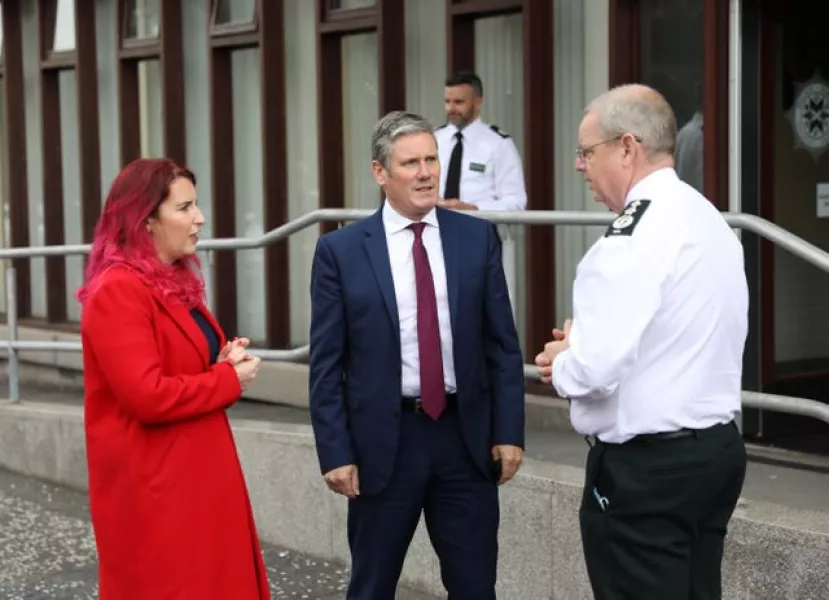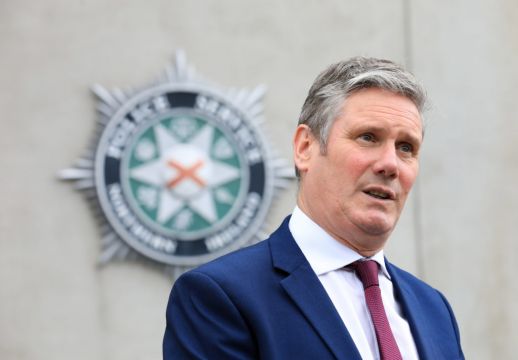The leader of the British Labour party, Keir Starmer, has accused the UK prime minister of having “betrayed” the people of Northern Ireland.
Mr Starmer was speaking during two days of official engagements in the region accompanied by shadow Northern Ireland Secretary Louise Haigh.
Reflecting on having worked in the North for six years with police in the early 2000s, Mr Starmer said he learned the importance of trust and the role of the UK government as an honest broker, bringing communities together.
There are tensions over the Northern Ireland Protocol, with unionists claiming the additional checks on goods are placing a border down the Irish Sea.

There have been demonstrations against the Protocol as well as legal challenges to it.
Mr Starmer told the PA news agency in Belfast that Boris Johnson had “not been straight about the consequences” of the Protocol.
“He is now pretending it is someone else’s problem, and in Northern Ireland that won’t wash,” he said.
“There has to be a practical way forward on this, I think there is a practical way forward if the parties are flexible and negotiate, but the most important thing is trust.
“There is a positive future here but it does require the British government to properly understand its role, and I think that this prime minister, Boris Johnson, has betrayed the people of Northern Ireland by not properly honouring that (the UK government being an honest broker), and the words that have been used in pretty well every meeting I have had here in Northern Ireland is a lack of trust in the prime minister as an honest broker.
“That is a massive missing piece.”

Mr Starmer visited Forge Integrated Primary School in Belfast on Thursday morning before meeting Police Service of Northern Ireland chief constable Simon Byrne at police headquarters in the city.
Speaking ahead of meetings with Northern political parties in Belfast, the Labour leader said the Good Friday Agreement and its promise of peace must “never be taken for granted”.
“Returning to Northern Ireland today, I can see how much is still at stake,” he said.
“The peace here was built on the trust, courage and commitment of the communities of Northern Ireland and political leaders. I felt that while working here in the years after Good Friday. And it is with those values in mind that I will go into today’s important meetings.
“This morning, I saw the transformation that peace helped bring about at an integrated school in Belfast. I saw the smiles of hope from young people as they look to the future. Whether we are in Westminster or Stormont, as political leaders we owe it to that generation to deliver on the promise of the Good Friday Agreement.
“We must recognise that trust is fragile, and progress is stalling. I understand the concerns of communities and businesses here about the problems with the Northern Ireland Protocol. I’m here to listen and to call for serious, practical solutions.”
Earlier in an opinion piece in The Times of London, Mr Starmer called on the UK government to negotiate a deal on veterinary standards that could reduce the needs for checks in the Irish Sea.

“The recent extension of the grace periods was welcome, but that is not a durable solution,” he said.
“Over a quarter of all trade to Northern Ireland is currently subject to onerous ‘SPS’ checks, largely on food and agricultural products.
“The UK and EU need to work out a veterinary standards agreement to bring assurance to the people of Northern Ireland and benefit food exporters across the UK.
“The United States has been clear that a veterinary agreement is not a fundamental barrier to signing an FTA.

“The prime minister promised an agreement of this kind during trade negotiations with the EU. Yet, where countries such as New Zealand and Switzerland have succeeded, he failed.”
The Irish Government has said an agreement on SPS, similar to that between Switzerland and the EU, could eliminate 80 per cent of checks.
Mr Starmer said he understood the concerns of the unionist community and businesses in the region about the barriers introduced by the Protocol, but added that it is now time for solutions.







